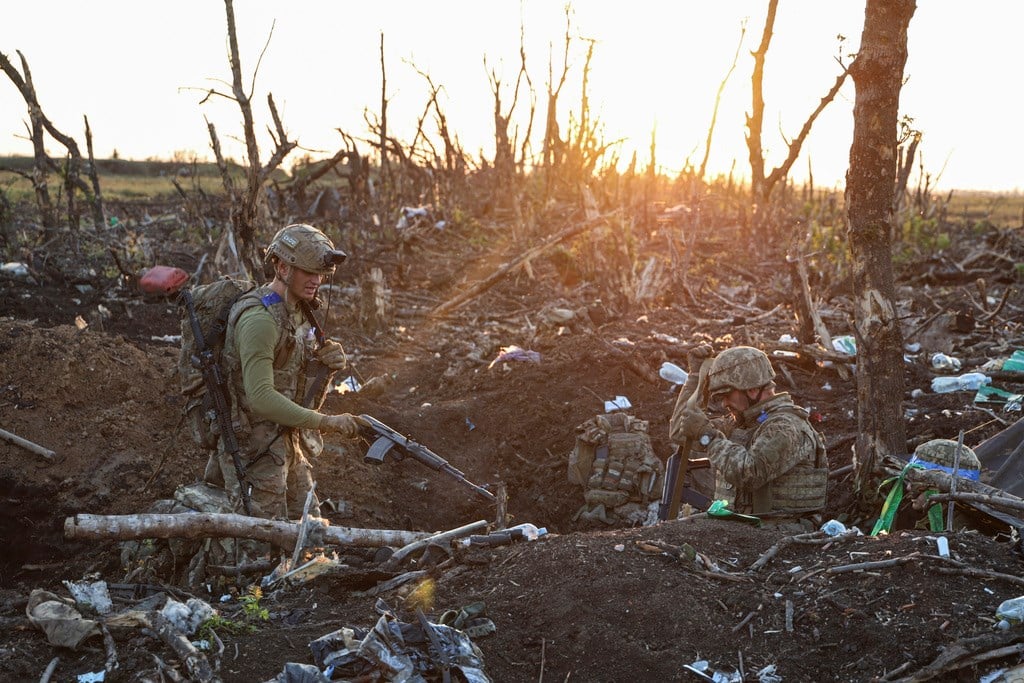Ukraine races time to keep cash flowing as defense expenses rise: WSJ
Hopes may also be crushed sooner than later, given that most of Ukraine's funds come from Europe and the US, especially if a Republican wins the elections next year as the GOP is exacerbating efforts to stop excessive US aid to Ukraine.
-

Assault unit commander from 3rd Assault Brigade who goes by the call sign 'Fedia' speaks with Ukrainian servicemen in the frontline a few kilometers from Andriivka, Donetsk region, on Saturday, Sept. 16, 2023 (AP Photo/Alex Babenko)
Another year into the war and suffering a budget deficit in 2024 of more than $40 billion, finance officials in Ukraine are racing time to keep the cash flowing every which way, and to keep their head above water.
Efforts to do so have included selling war bonds, lobbying for international aid, and repositioning existing debts, while others include taxing financial intermediaries like Euroclear which allegedly profit from Russian assets, and raising money by using complex structures from international bond investors.
Head of macroeconomic research at Ukraine-based brokerage ICU, Vitaliy Vavryshchuk, said: "If the government cannot cover its budgetary gaps, then the government will not be able to finance its military effort".
ICU is launching a program in consultation with the government this week intended to remotely sell government bonds to individuals residing abroad, namely in Western Europe, but still, that would likely be a drop in the bucket that Ukraine needs to fill.
Read more: West encourages Kiev to switch from offense to defense in Oct: Reports
This is also why Ukraine has been ramping up its efforts to get admitted into the European Union because it would give it access to hundreds of billions of euros.
A GOP Threat?
According to research by ICU, Ukraine’s government raised its 2023 growth expectation to 4% from 1% which has in turn led to a sharp rise in the prices of its international bonds since June.
Still, the country's economic flow will likely end this year at about 25% below pre-war levels, and according to MarketAxess, international bonds traded around 29 cents on the dollar just this last week.
Parliament is also due to vote on a third jump in defense outlays, as the country's forces continue to consume around 90,000 artillery shells a month - skyrocketing the expense this year to $40 billion from $30 billion. As a result, the finance ministry revealed plans last week to raise security spending to $45 billion next year.
Those hopes may also be crushed sooner than later, given that most of Ukraine's funds come from Europe and the US, especially if a Republican wins the elections next year as the GOP is exacerbating efforts to stop excessive US aid to Ukraine.
Yuriy Butsa, head of public debt management in Ukraine’s Finance Ministry, told WSJ, "If we win the war within a year, Russia is still our biggest fear," adding: "How do you price the risk that Russia attacks again?"
Even its domestic bond market is in trouble, as it borrowed $10 billion through local bond sales this year, surpassing the $8.5 billion allocated by the US.
Read next: Money will eventually push EU to force Kiev into peace talks: Orban
To put the cherry on top, the World Bank believes that Ukraine will need at least $411 billion to rebuild after the war is over.
Red flags, fair game
International bondholders such as MFS Investment Management, BlackRock, and Fidelity Investments, agreed to give Ukraine a break last year for about $20 billion of debt until mid-2024. Yet, the Finance Ministry is still hoping to restructure the bonds next year, but it would still require asking investors already reluctant, to forgive part of the debt and swap the remaining into new securities.
As mentioned earlier, one of the efforts is to harbor interest income collected by financial clearinghouses like Belgium-based Euroclear on almost $280 billion of frozen Russian assets. Analysts believe that giving those funds to Ukraine would raise legal and diplomatic red flags but would still be a fair game.
In the first half of this year, Euroclear collected $1.7 billion of interest on $150 billion of Russian assets wound up in international sanctions as it is currently in talks with EU officials to relocate some money to Ukraine through a windfall tax paid to the European Commission.
Some suggestions include permitting Euroclear to keep a significant amount from the $1.7 billion, according to sources familiar with the updates, and the company reported $22 million of costs tied to Russian sanctions from January to June.
A spokesperson for the European Commission stated that it is prepared to present a legal proposal considering discussions with EU members regarding a windfall tax.

 4 Min Read
4 Min Read








